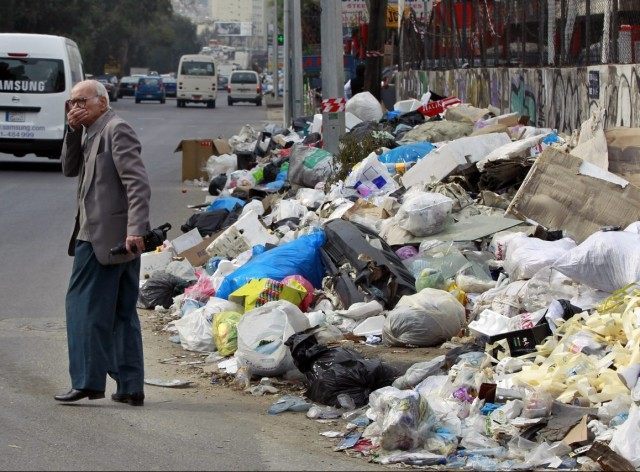This morning’s key headlines from GenerationalDynamics.com
- Paralyzed Lebanon decides to export its garbage to Europe
- Syrian refugees in Lebanon increasingly face starvation
Paralyzed Lebanon decides to export its garbage to Europe

A man covers his nose from the smell of the garbage in a Beirut street (AP)
Lebanon’s government approved a decree on Monday to export the garbage generated by the citizens of Beirut and Mount Lebanon to Europe. This would include much of the trash that has accumulated around the capital region, last estimated in November to exceed 100,000 tons.
There will be two firms under contract: Howa BV, of Holland and Chinook Urban Mining International of Britain. It has not yet been announced where the garbage will be dumped after it leaves Lebanon. The two European firms will charge Lebanon $212 per ton to remove the garbage, about $60 per ton more than Lebanon used to pay the Lebanon’s garbage contractor, Sukleen.
The garbage crisis began on July 17 when Lebanon’s dysfunctional government simply closed Beirut’s main landfill, without providing any alternative. With no place to go, residents simply piled the garbage in the streets. The smell has become increasingly putrid. Every time it rains, streams of garbage flow down the streets. One video that went viral showed uncollected garbage being swept down a flooded street in Beirut. The filth is seeping into the drinking water, and dysentery is feared.
Lebanon’s government became officially paralyzed and dysfunctional on May 24, 2014, when Lebanon’s last president, Michel Sulaiman, ended a six year term, and officials were unable to select a successor president. Hezbollah and various political coalitions continually boycotted meetings and sabotaged processes, rather than risk have an opposing party or coalition win the presidency. There is still a cabinet, and the ministers in the cabinet are empowered to make some decisions, but that’s largely dysfunctional as well.
By August, tens of thousands of demonstrators were filling the streets of Beirut in the new “You Stink” campaign, where the protesters were using the epithet to describe both the garbage and the government. That led to violence, as Lebanon’s security forces fired weapons, sprayed tear gas and water cannons, and arrested dozens of protesters.
Out of desperation, the cabinet did finally reach a decision on Monday to contract to the two European firms to haul the garbage away.
One politician patted himself on the back:
The Cabinet has turned a new page today and lifted a great weight off the backs of the people.
However, another politician was more direct:
We’ve gotten to the point where we’ll agree to anything. We have no choice but to finish with this garbage, exports or otherwise.
However, the crisis is far from over. Exporting trash is governed by the United Nations Basel Convention which requires exporters to declare the hazardous content of their waste, something that Lebanon may not even be capable of. Another problem is that no decision has been made as to where the money will come from to pay the garbage export contractors. So even in the rosiest scenario, garbage exports will not begin for weeks or months.
And Lebanon still has no president. Daily Star (Beirut) and Gulf News (Dubai) and Daily Star (Beirut) and The National (Dubai)
Syrian refugees in Lebanon increasingly face starvation
Lebanon, with a population of less than 5 million people, is hosting more than one million refugees from Syria. International contributions to aid the refugees have been dwindling, and food insecurity is mounting. In 2014, 49% of the refugees were below the poverty line of $3.84 per day, but now some 70% are below the poverty line, according to the United Nations.
According to the UN report:
With the Syrian conflict now in its fifth year, the refugees face severe restrictions on accessing the Lebanese labor market, their assets and savings are increasingly exhausted, their debts are mounting and they must fulfil specific requirements to legalize their stay in Lebanon.
With refugees generally forbidden by law to take jobs in Lebanon, some refugees are making money on the side by growing and selling cannabis. According to one landown and grower of cannabis: “Any job in Lebanon makes you $700 per month, but working with drugs can get you $10,000 a day.” United Nations and Reuters
KEYS: Generational Dynamics, Lebanon, Howa BV, Chinook Urban Mining International, Michel Sulaiman, You Stink, Syria
Permanent web link to this article
Receive daily World View columns by e-mail

COMMENTS
Please let us know if you're having issues with commenting.